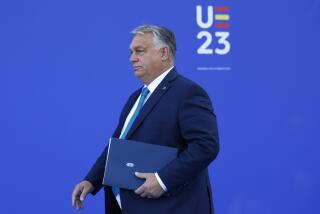No One ‘Lost’ East Europe, Gorbachev Says : Congress: The freedom of foreign nations is not our business, the president tells party leaders.
- Share via
MOSCOW — Weighing in on the recent Kremlin debate over “who lost Eastern Europe,” President Mikhail S. Gorbachev contended Monday that the freedom of foreign nations is not the Soviet Union’s to give or take away.
In his speech to the opening session of the 28th Communist Party Congress, Gorbachev rejected the imposition of ideology on former allies as a remnant of the Stalinist past that he has been trying to exorcise with perestroika.
“When somebody says that this is the ‘collapse of socialism,’ we counter it with the question: What socialism?” Gorbachev said, discussing Soviet foreign relations. “That which had been, in point of fact, a variation of Stalin’s authoritarian bureaucratic system--which we have ourselves discarded?”
His defense of the Kremlin’s recent go-your-own-way doctrine in Eastern Europe served both to assure the neighboring nations that their revolutions are safe from Soviet interference and to tie his own flagging reform program to the efforts that have brought freely elected governments to power and begun the transition to market economies there.
Foreign Minister Eduard A. Shevardnadze and Defense Minister Dmitri T. Yazov squared off in the press last week with opposing views on whether last year’s overthrow of Communist regimes in Eastern Europe was a blow to Soviet security or a boost to the forces of democracy.
Yazov argued that the democratic upheavals in once-fraternal nations have undermined the Warsaw Pact defense alliance, while rival NATO has made no attempt to change its military posture.
Hungary has vowed to pull out of the Warsaw Pact next year, with Czechoslovakia indicating similar interest and East Germany merging economically with the NATO front-line state of West Germany.
Comecon, the 10-nation socialist trading alliance dominated by the Soviet Union, has begun unraveling as the new democracies look for business ties to the West. Moscow said last week that in the future, it will conduct all its trade with Comecon members in U.S. dollars rather than Soviet rubles.
In an interview with the Communist Party daily Pravda, Shevardnadze last week dismissed the claims of a security setback, arguing that “neither socialism nor friendship, neither respect nor good relations can rest on bayonets, tanks or bloodshed.”
Invading Soviet tanks crushed attempts to throw off communism in Hungary in 1956 and efforts at reforming it in Czechoslovakia in 1968, drawing condemnation in the West and sowing resentment throughout the region.
Gorbachev made clear during his three-hour speech that he sides with his foreign minister, praising the restoration of freedom in the Eastern European nations forced into the Communist fold after World War II.
“We are even reproached with ‘leaving the field without fighting,’ ” Gorbachev said in apparent reference to comments that Yazov made in an interview with the newspaper Workers’ Tribune. “It comes out that we are advised to resort just to what we resorted before and what we have unequivocally broken with and emphatically denounced.”
The Kremlin leader reiterated his promise to stay out of the decisions of sovereign nations about what kind of governments they choose to create.
More to Read
Sign up for Essential California
The most important California stories and recommendations in your inbox every morning.
You may occasionally receive promotional content from the Los Angeles Times.














